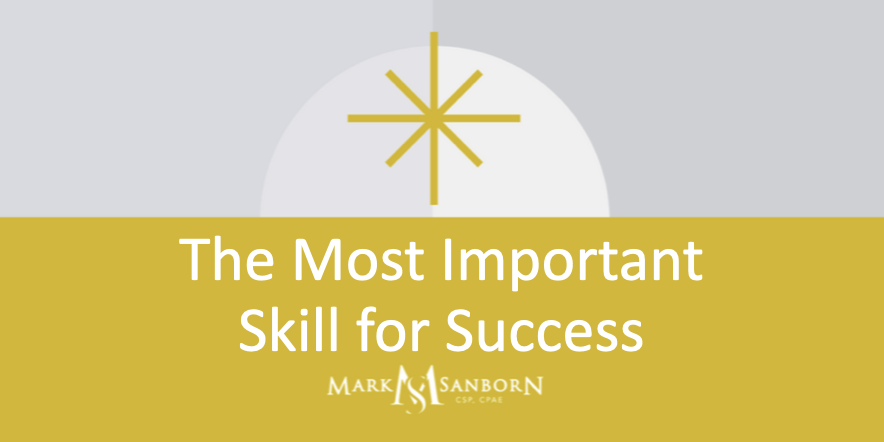What do all successful people have in common, regardless of occupation or location?
Intentionality.
In my book, The Intention Imperative, I define intentionality as being crystal clear on what you want to achieve and taking the right action every day to achieve it.
But is there one skill more important than all others for achieving and sustaining success? I believe there is.
It drives intentionality.
If intentionality is the engine, then this skill is the fuel.
You might guess the most important skill is learning, and in a way, you’d be right.
Learning is essential. It keeps you growing and improving and makes life richer and more interesting.
But there is something even more important:
Knowing how to learn.
Emerson said every artist was at first an amateur. The problem is that many of us got stuck at the amateur level of learning. We’ve in general not been taught how to learn. We picked up some skills almost accidentally, or out of necessity. We were exposed to the process during our formal education, but few were taught how to learn. We learned enough to pass or excel in a class, but not how to keep learning after the class was over or the best way to learn quickly and retain the lessons.
I encourage you to learn how to learn better, to increase your learning bandwidth.
By studying the best philosophies and skills for learning, you can leverage your current success and keep ascending with the new insights and ideas improved learning will produce.
Here are some keys to learning how to learn:
Learning doesn’t happen accidentally. Abigail Adams said, “Learning is not attained by chance. It must be sought for with ardor and attended with diligence.” In my book, The Potential Principle, I write “The only thing that gets better accidentally with time is wine. The rest of us have to be intentional.” You must act on your desire to learn, take advantage of the best resources and have a plan for ongoing intellectual improvement. Make learning a daily activity by scheduling time for intentional learning (What do I want to learn?) and for reflection (What new insights did I learn today?).
Learn from those who know. I’ve noticed an increase in the number of books that explain how to learn. This is terrific for two reasons. First, few have taken time to study the process of learning and how to do it well. Second, much of what was believed to be true of the learning process has been updated and improved, if not discarded. Here is a starter list of some great books on learning (not sure I’d agree that these are “the very best” but agree this is an excellent list): Books on Learning.
And here’s another resource I really enjoy: The Learn Letter by Eva Keiffenheim. She discusses learning strategies and offers useful websites and other sources.
Think “who” before “how.” I’ve wasted much time in my life starting from scratch. As you increase your network, you’ll find there are people in it who already know what you want to learn. They might not be the person to teach you, but they can direct you to the best resources and save you much time if you ask them for suggestions.
Conquer questions. We used to think leaders were those who knew the right answers. I believe real leaders are those who ask the best questions. The learning process is improved when we ask more and better questions, especially those that go beyond the obvious. Answer your questions, but then question your answers. The sooner you assume you’ve learned the right answer, the sooner you miss finding a better answer.
Write it down to retrieve it. Learning only happens when you are able to recall and apply. For years I heard a cute cliche, if there is such a thing, that says “A short pencil is better than a long memory.” Not many pencils are being used these days, but whether the instrument is a pen, a cell phone or a computer, recording insights, ideas and lessons you can revisit and review is critical for becoming more learned.
Get a steady diet of feedback. You won’t get better at what you don’t know you’re doing wrong. Deliberate practice, pioneered by psychologist Anders Ericsson, made me more aware of the power of feedback from a coach or mentor. (And here is an excellent article on deliberate practice).
To learn it best, be able to teach it well. The Feynman technique has four key elements and one is to pretend to teach what you’ve learned to a child. Actually being able to teach what you’ve learned has many benefits, including reinforcement and retention of the concepts and an increased ability to learn more deeply. Again, the folks at FarnamStreet.com have a very meaty article about this technique here.
Annie Dillard said, “I would like to learn, or remember, how to live.” Isn’t that the point?
Learning isn’t useful unless it improves how we live.
By learning, we can live better, and by learning how to learn we can live better yet.
The ability to learn how to learn better is a multiplier available to anyone who desires it. You’ve got to be intentional to succeed, but put learning well first and throughout the process. You’ll not only succeed, but succeed more and better when you’ve mastered this essential skill.
Mark Sanborn is an award winning speaker and Leadership Expert in Residence at High Point University, the Premier Life Skills University. For more information about his work, visit www.marksanborn.com.
For a free assessment and information about The Classic Fred Factor online training and a unique opportunity to license the training, go to www.FredFactor.com.








